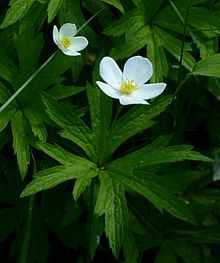Anemone canadensis
| Anemone canadensis | |
|---|---|
 | |
| Conservation status | |
| Endangered in some areas | |
| Scientific classification | |
| Kingdom: | Plantae |
| (unranked): | Angiosperms |
| (unranked): | Eudicots |
| Order: | Ranunculales |
| Family: | Ranunculaceae |
| Genus: | Anemone |
| Species: | A. canadensis |
| Binomial name | |
| Anemone canadensis L. | |
Anemone canadensis (Canada anemone, round-headed anemone, meadow anemone, crowfoot)[1] is a herbaceous perennial native to moist meadows, thickets, streambanks, and lakeshores in North America, spreading rapidly by underground rhizomes, valued for its white flowers.
Description
Shoots with deeply divided and toothed basal leaves grow from caudices on long, thin rhizomes.
Flowers with about 5 sepals and numerous stamens bloom from late spring to summer on stems above a cluster of leaves.
Seeds are achenes, borne in a small dense head.
Uses
In former times it was used medically by North American Indigenous peoples as an astringent and as a styptic for wounds, sores, nosebleeds, and as an eyewash. The root was respected by Plains tribes and used for many ailments.
Toxicity
It is likely that most Anemones contain the caustic irritants of the Ranunculaceae family. [2]
References
- ↑ Nathaniel Lord Britton, Addison Brown (1913). An Illustrated Flora of the Northern United States, Canada and the British Possessions: From Newfoundland to the Parallel of the Southern Boundary of Virginia, and from the Atlantic Ocean Westward to the 102d Meridian 2. C. Scribner's sons. page 99
- ↑ Foster, Steven and James A. Duke. Eastern/Central Medicinal Plants, "Peterson Field Guides", Houghton, Mifflin 1990 edn. ISBN 0-395-92066-3
External links
| Wikimedia Commons has media related to Anemone canadensis. |
| Wikispecies has information related to: Anemone canadensis |